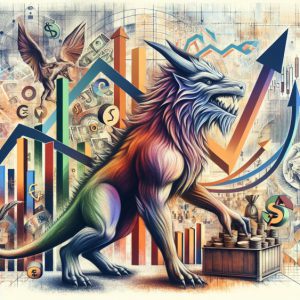Stock Market Psychology PDF: Navigating Real-World Not Pdf files
Updated April 15, 2024
The stock market is a vast, intricate canvas of numbers, trends, and patterns. Yet, behind this apparent rationality, there’s an underlying current of human emotions driving these movements. This is the realm of stock market psychology, a fascinating perspective that looks at the market through human emotions..
The cycle begins with Uncertainty, a stage marked by confusion and hesitation. Market participants are unsure what steps to take, often resulting in erratic buying and selling. Uncertainty can stem from a sudden market downturn, unexpected news, or a shift in market trends. It’s a stage filled with questions, doubts, and a palpable sense of not knowing what lies ahead.
As uncertainty escalates, it morphs into Fear. An overwhelming sense of dread and panic marks this stage. Fear grips investors as the market dips lower, leading to a selling spree. Fraught with anxiety, they dump their holdings, hoping to mitigate potential losses. The market becomes chaotic and panicky as fear overrides rational decision-making.
But as the saying goes, “After a storm comes a calm.” Following the fear stage, the market shows signs of recovery, leading to Excitement. Investors see their stocks inching upwards, and a wave of optimism builds. It’s a stage characterized by renewed hope and growing belief in the market’s potential.
This excitement builds into Joy as the stocks continue their upward climb. This stage is a period of happiness and satisfaction as portfolios start to look healthier. The market buzzes with positive sentiment, and investors feel a sense of relief.
Joy evolves into Euphoria, the stage where investors feel invincible. There’s a sense that the market can only go up, and dreams of untold riches start to take shape. Investors pile in more money, believing their stocks will skyrocket. The market is in a state of ecstasy, and investors revel in their perceived success.
But as with all euphoric states, reality eventually sets in. The market stops its upward trend, leading back to Uncertainty. Euphoria gives way to doubt, and the cycle begins anew.
Understanding these emotional stages is crucial as it helps investors navigate the turbulent waters of the stock market. By recognizing these emotions for what they are – fleeting and transient – investors can make more rational, informed decisions, breaking free from the emotional cycle that so often leads to financial missteps. This is the true art of mastering stock market psychology.
Uncertainty: The Achilles Heel
Uncertainty, defined as being unsure or not knowing, holds profound implications for individuals across various aspects of life. The complex relationship between uncertainty and emotions is a subject of extensive exploration in psychological disciplines. Often associated with negative feelings, uncertainty triggers anxiety as the brain perceives potential dangers, leading to the creation of untested assumptions. Studies reveal that people exhibit greater calmness when anticipating inevitable pain than when facing uncertainty, showcasing the profound impact of the unknown.
Intolerance of uncertainty is a hallmark of anxiety disorders and is linked to various psychological conditions such as depression and eating disorders. Even for those not diagnosed with mental health conditions, uncertainty can disrupt overall well-being. In decision-making, uncertainty induces stress and may lead to potentially irrational choices, particularly in professional settings where risk attitudes can differ based on personal and company-related financial decisions.
Beyond mental health, uncertainty affects physical well-being, as evidenced by studies on workplace reorganization’s impact on employees. Recognizing uncertainty as a significant stressor is crucial for mental and physical health. Effectively understanding and managing responses to uncertainty becomes essential for making informed decisions and preserving overall well-being in life’s unpredictable nature.
Conclusion
The stock market is not just a collection of numbers and trends but a reflection of human emotions. This cycle of emotions, from uncertainty to euphoria, significantly influences investor behaviour and market movements. For instance, the fear stage can lead to panic selling, while the euphoria stage can result in overinvestment due to an inflated sense of invincibility. Recognizing these emotional stages can help investors make more rational decisions, breaking free from the emotional cycle that often leads to financial missteps.
For example, during the 2008 financial crisis, uncertainty and fear led to a massive sell-off, causing the market to plummet. However, as the market recovered, excitement and joy led to a bull market. Understanding these emotional stages can help investors make more rational decisions, such as not selling off in panic during a downturn or not overinvesting during a market high.
Uncertainty, in particular, can have profound implications, triggering anxiety and potentially irrational choices. It can disrupt overall well-being and induce stress, particularly in professional settings where risk attitudes can differ. For example, sudden market downturns or unexpected news can create uncertainty, leading to erratic buying and selling in the stock market. A good illustration of this emotion at work was during the COVID-19 pandemic; the uncertainty surrounding the virus and its impact on the global economy led to volatile market conditions. Recognizing and managing responses to uncertainty is essential for making informed decisions and preserving overall well-being in life’s unpredictable nature.
Immerse in Thought-Provoking Content

Rise in Sexual Immorality: Alarming Trends

How To Get Financial Freedom Fast: Escape the Herd for Lasting Success

Giving Content to Investor Sentiment: The Role of Media in The Stock Market

Considering the impact of inflation, Why Is Investing Important?

Technical Analysis of Stocks and Commodities: Unveiling Insights

Why Is the US Education System So bad: Rubbish In, Rubbish Out Phenomenon

Investor Sentiment in the Stock Market Journal of Economic Perspectives

Mass Psychology of Fascism: Unmasking Bombastic News

Identifying Trends and Buying with Equal Weighted S&P 500 ETF

Real Doppelgangers: The Risks in the Age of AI

The Intelligent REIT Investor: How to Build Wealth with Real Estate Investment Trusts

TGB Stock Forecast: Rising or Sinking

Stock Market Crash Date: If Only The Experts Knew When

Reasons Why AI Is Bad: The Dark Truth?

The Inflationary Beast: Understanding What Inflation is and What Causes It



